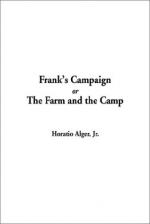“I move that Mr. Morton’s offer be accepted, with thanks,” said Henry Tufts.
The motion was seconded by Tom Wheeler, and carried unanimously, with the exception of one vote. John Haynes sat sullenly in his seat and took no part in it.
“Who shall belong to the company?” asked the chairman. “Shall a fixed age be required?”
“I move that the age be fixed at eleven,” said Robert Ingalls.
This was objected to as too young, and twelve was finally fixed upon.
John Haynes moved not to admit any one who did not attend the academy. Of course, this would exclude Frank, and his motion was not seconded.
It was finally decided to admit any above the age of twelve who desired it, but the boys reserved to themselves the right of rejecting any who should conduct himself in a manner to bring disgrace upon them.
“Mr. Chairman,” said Frank, “in order to get under way as soon as possible, I have written down an agreement to which those who wish to join our proposed company can sign their names. If anybody can think of anything better, I shall be glad to have it adopted instead of this.”
He handed a sheet of paper to the chairman, who read from it the following form of agreement: “We, the subscribers, agree to form a boys’ volunteer company, and to conform to the regulations which may hereafter be made for its government.”
“If there is no objection, we will adopt this form, and subscribe our names,” said the chairman.
The motion for adoption being carried, the boys came up one by one and signed their names.
John Haynes would have held back, but for the thought that he might be elected an officer of the new company.
“Is there any further business to come before the meeting?” inquired the presiding officer.
“The boys at Webbington had a company three or four years ago,” said Joe Barry, “and they used wooden guns.”
“Wooden guns!” exclaimed Wilbur Summerfield disdainfully. “You won’t catch me training round town with a wooden gun.”
“I would remind the last three gentlemen that their remarks should be addressed to the Chair,” said the presiding officer. “Of course, I don’t care anything about it, but I think you would all prefer to have the meeting conducted properly.”
“That’s so!” exclaimed several boys.
“Then,” said the chairman, “I shall call to order any boy who addresses the meeting except through me.”
“Mr. Chairman,” said Frank, rising, “as to the wooden guns, I quite agree with the last speaker. It would seem too much like boy’s play, and we are too much in earnest for that. I have thought of an arrangement which can be made if the Selectmen will give their consent. Ten or fifteen years ago, longer than most of us can remember, as my father has told me, there was a militia company in Rossville, whose arms were supplied and owned by the town. When the company was disbanded the muskets went back to the town, and I believe they are now kept in the basement of the Town Hall. I presume that we can have the use of them on application. I move that a committee be appointed to lay the matter before the Selectmen and ask their permission.”




